
Flexible Education: Necessity and Guidelines
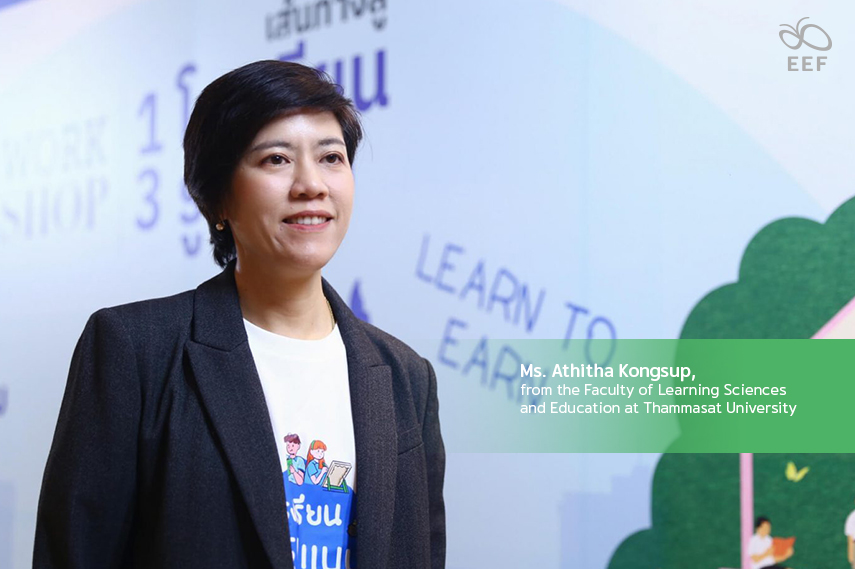
At the workshop titled “The Path to ‘1 School, 3 Models’: Enhancing Flexible Education to Prevent School Dropout,” organized by the Equality Education Fund (EEF) Thailand, Ms. Athitha Kongsup from the Faculty of Learning Sciences and Education at Thammasat University emphasized the importance of bridging the gap between formal and non-formal education. She introduced the ‘Seamless Education’ concept, which envisions a flexible and continuous learning experience accessible anytime, anywhere. In collaboration with the Faculty of Learning Sciences and Education at Thammasat University and Thailand Science Research and Innovation (TSRI), studies conducted for national policy development identified key dimensions and issues that could guide the country’s educational strategies. The findings revealed significant gaps that must be addressed to make ‘Seamless Education’ effective. These gaps currently pose barriers preventing certain youth groups from accessing quality education.
Ms. Athitha Kongsup discussed the need to adapt the education system to be more flexible and inclusive by implementing the ‘Credit Bank’ system and ‘Experience Certification.’ These approaches aim to ensure that all children can access education without being constrained by traditional learning formats. She also highlighted the importance of interdisciplinary integration to minimize boundaries between academic subjects and enhance learning efficiency. By connecting different disciplines, children can apply their knowledge in everyday life and develop skills to appreciate and accept diversity better.
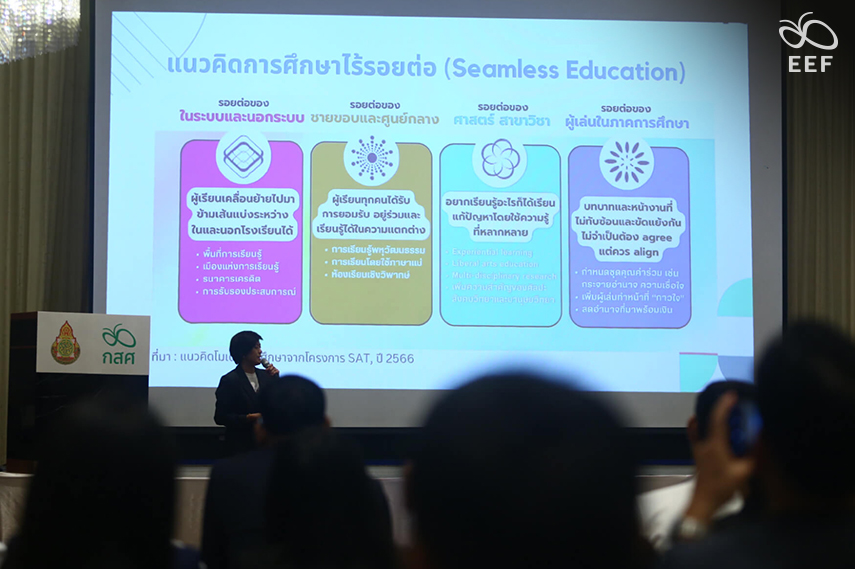
Children will receive a more holistic education if learning management minimizes or eliminates the boundaries between academic subjects. This approach addresses their interests and helps them develop skills to appreciate and embrace diversity.
“The integration area requires a shift in mindset, as deep and insightful learning doesn’t have to be confined to traditional academic subjects. Instead, it is possible to study both broadly and deeply simultaneously. By adjusting the traditional subject-based teaching structure, we can connect various fields of knowledge within a single day of learning. This approach would provide alternative learning experiences that address real-life needs, ultimately fostering true happiness and a sense of purpose.”
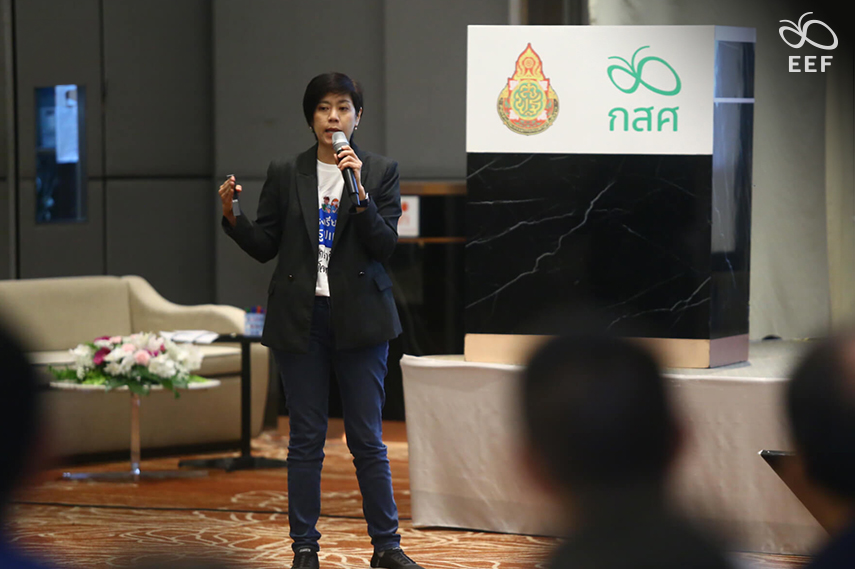
The Challenge of Collaboration
Another challenge mentioned by Ms. Kongsup is the issue of boundaries among the “players in the education sector.” With numerous departments handling overlapping tasks, there are often differing criteria, procedures, targets, and policies. This can lead to content conflicts, process inconsistencies, and working group confusion.

Seamless Coordination
Everyone does not need to agree on everything for work to be coordinated seamlessly. The focus should be on identifying common goals and dividing duties to work collaboratively towards these goals with confidence and trust in decentralization. Effective collaboration requires a space where all opinions are heard, with a role acting as the ‘glue’ to unify different perspectives. By doing so, obstacles that hinder progress may be resolved.
Support from the Ministry of Education
Dr. Siripong Angkasakulkiat, Assistant to the Minister of Education, chaired the opening of a workshop on the same topic at the Asawin Grand Convention Hotel in Bangkok. He highlighted the flexible education arrangement of ‘1 School, 3 Models’, which aligns with the ‘Good Education, Happy Life’ policy of creating learning opportunities for all children and youth.
Adjusting the Role of Teachers and the Evaluation Process
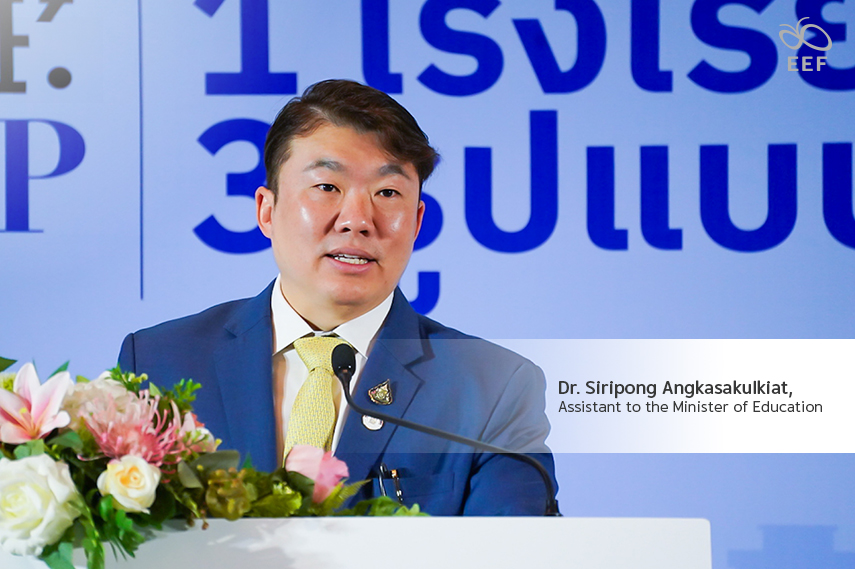
Dr. Angkasakulkiat discussed the need to adjust the role of teachers to act as knowledge facilitators and to make the evaluation process more flexible, as outlined in Section 15 of the National Education Act B.E. 2542 (1999). These changes aim to enhance accessibility to education and emphasize the development of soft skills, which are crucial for helping children adapt and thrive in society.
“Today’s educational model has evolved from the past. Some subjects are no longer essential for children to learn, so schools must adapt their roles. Teachers have transitioned from being mere knowledge transmitters to becoming coaches. Nevertheless, schools remain crucial in cultivating various soft skills children cannot acquire independently. These skills are developed through direct experiences and interactions.”
The Launch of the ‘Credit Bank’ System
In May 2024, the Ministry of Education launched the ‘Credit Bank’ System, which was developed collaboratively by the Office of the Education Council, the OBEC, and the Office of the Vocational Education Commission. This system enables students to earn credits from various forms of learning, which can be applied to their future studies and careers. It allows educational institutions to define various subjects and integrate lessons, helping students effectively acquire and develop the skills needed in today’s era.
“The essence of the Credit Bank system extends beyond vocational skills training. It allows educational institutions to offer a diverse range of subjects, enhancing the learning experience in core areas. This system facilitates the integration of lessons that students can accumulate as credits toward graduation. Additionally, it enables students to apply their knowledge and experiences to further studies or their careers. The curriculum is designed to adapt to rapid changes, emphasizing short courses that remain flexible and responsive to evolving needs.”
“Launching the Credit Bank system will be pivotal in preventing youth from dropping out of the education system, as it is designed to adapt to learners’ lifestyles. On behalf of the Ministry of Education, I extend my gratitude and encouragement to everyone involved. We are committed to supporting all parties in advancing alternative learning solutions in Thailand that address diverse needs and enrich lives.”
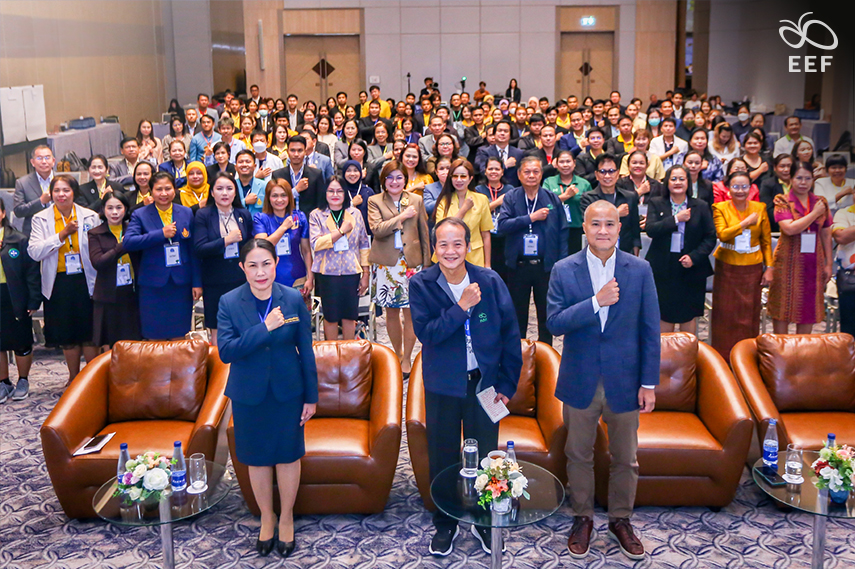
Cooperation and Expansion
The activities organized by EEF Thailand serve as a model for the three education systems, which can be extended to schools across the country. The Ministry of Education will support and encourage all schools to adopt this concept to create flexible and seamless education in line with the National Education Act. This Act outlines three forms of education: formal, non-formal, and informal. Traditionally, learning and teaching could be organized in any format or a combination of these three. Some children in the system may have to drop out due to unfavorable economic and social conditions. Education should serve two primary purposes: excellence and stability in life. Therefore, an educational system that provides stability is considered a valid objective. The goal of achieving the ‘Zero Dropout’ policy is to ensure that no child falls out of the system by implementing the ‘1 School, 3 Models’ approach. The Ministry of Education is committed to advancing this initiative. OBEC is drafting guidelines to ensure that the system operates consistently and effectively throughout the country.
“There are various forms of education, and their effectiveness depends on how they are applied. The English Program (EP), Home School systems, and specialized subject programs illustrate this diversity. Some schools are piloting a reduction in subject groups from eight to just five while maintaining the same level of knowledge. In other schools, lessons are integrated to give students a broader body of knowledge than the original framework. Therefore, the quality of learning management depends on prioritizing study hours and adjusting indicators to keep pace with changes.”
The activities organized by the Equitable Education Fund demonstrate that if a school successfully implements the three education systems, the results can be replicated in other schools. Workshop participants can adapt the prototype lessons to fit the needs of their respective educational institutions.
In conclusion, flexible and seamless education is crucial for preventing dropouts from the education system. Utilizing the Credit Bank system and integrating various academic subjects can enhance educational opportunities and increase equality. The Ministry of Education fully supports these efforts to achieve Thailand’s Zero Dropout goal. These initiatives will ensure that every child has access to education and the opportunity to develop their full potential.

